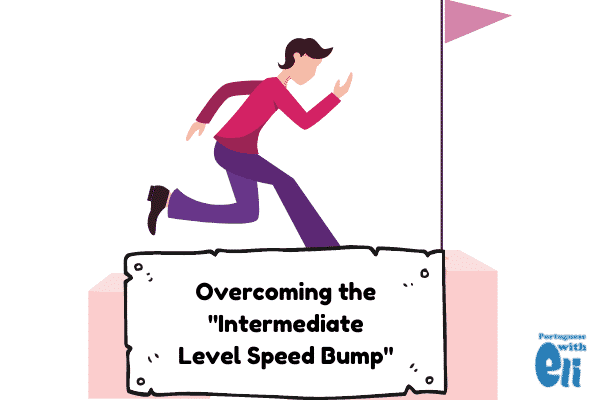Reached Intermediate? 5 Ways to Overcome Your Language Learning Obstacles

You did it. You finally reached the intermediate level in Portuguese – or whatever language you may have been studying.
You no longer make rookie mistakes like confusing tenses – when the sentence is simple – or not knowing the vocabulary – when the topic is familiar to you.
You feel very comfortable talking to strangers in your foreign language. But…
When the topic doesn’t lie in your field of expertise…
Or when you want to get a more intricate idea across…
You finally see you reached the intermediate level plateau.
The intermediate level plateau?
Yes, that’s a technical term that we use in the language learning community to describe that sensation that you are just wading through swampy land.
No sense of progress, long-gone sense of achievement, and mild depression that threatens to set in.
I know that sensation. I’ve been there in more than ten languages.
In fact, I’m still there in many of the languages I’ve learned the past (oh, French, why did they let it happen?). But luckily, I managed to progress in some of them with the help of friends and other experts.
And here you’ll find five ways you can overcome this language-learning obstacle.
1 – Understand the Language Learning Levels
Well, if you reached the intermediate level, it stands to reason that you know the language learning levels.
That’s true, but there are more accurate descriptions that encompass the situation in which we all are.
For example, when you state that you’ve learned intermediate Portuguese how do you mean exactly? Have you flipped through the pages of your textbook up to unit six out of twelve? What are you able to do with your intermediate level?
And although I advise you to think about your situation carefully, you can also resort to the descriptions of proficiency provided by the European Framework for foreign language learning.
You’ll see that when you say you have reached the “intermediate” level, it’s not an actual language learning level but rather a comprehensive concept that has no scientific validity.
You may find yourself at the intermediate level in reading but perhaps in speaking you can do much better (or, in my case, much worse).
That’s why it’s important to know the distinctions between each level.
2 – Learn Your Language by Immersion
As I am writing this, the pandemic has gotten even worse in Brazil and many other countries. Immersion is almost impossible right now.
But there is a solution one of my friends suggested I do – and I followed through.
When I lived in my family’s house, I was lucky enough to have a room for myself. So I decorated everywhere with things that reminded me of my target language of the time (Mandarin Chinese).
Whenever I would walk into my bedroom I would allow myself to listen to Mandarin Chinese only. Even though I couldn’t read of the time, I would keep books around me just to remind myself of my target language. I would listen to songs in Chinese. It would do pretty much everything I could by using the language.
But when I walked out of my bedroom, I was back to Portuguese.
If you can’t have a room for yourself, try to reserve at least a corner in your house to be the language corner. Whenever you’re there, force yourself to use your target language.
And what will you do there? Well, one of my tips is…
3 – Listen to Language Learning Podcasts
The good thing the Internet brought us is that most of the things we need are free.
Of course, if you want to have language lessons, having a teacher is actually one of your best investments.
But when you just want to keep the language from being forgotten, free language learning podcasts are enough.
If you’re an Android user, I highly recommend the Podcast Republic app. It’s free and highly functional. All you have to do is search for a podcast in your target language (even by country).
And if you’re learning Portuguese, remember: we have our Intermediate Portuguese podcast, and other recommendations, too.
4 – Scour Free Language Learning Websites
Podcasts comprehend only one kind of free resource that you can have online.
Free language learning websites with actually usable material abound on the Internet. All you need to do is be patient and do the right Google search.
Try typing “learning [target language] language website” or “learning [target language] language site” for starters.
And many foreign language websites are actually written in the foreign language. Try using keywords in your target language.
If you’re learning Portuguese, our website provides lots of free resources for those who are not ready for a teacher yet. And you can always contact us and follow us on YouTube and other social media.
5 – Share Your Goals
When you reach the intermediate level and find yourself in a rut, unable to progress, it’s very easy to give up and do what I did for more than five languages.
But when you keep yourself accountable, that hardly ever happens.
That’s why, for instance, I have been able to achieve C1 in English and advanced overall in Mandarin Chinese. There were people breathing down my neck at all times. Now I’m trying to do that with Cantonese and Russian.
And how can you do that? It could be as simple as sharing that with your social media friends… Or keeping an entire website or blog to document your language learning journey.
Whichever route you choose, remember to share it with us 🙂 I, for one, will be glad to give you the motivation to go on!
So, whenever you find yourself in a linguistic cul-de-sac, remember: pushing on is hard but brings results. Giving up is easy but gives you nothing.
Do you have any tips to share with us? Leave it in the comments section below.






